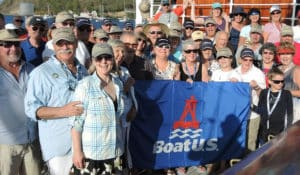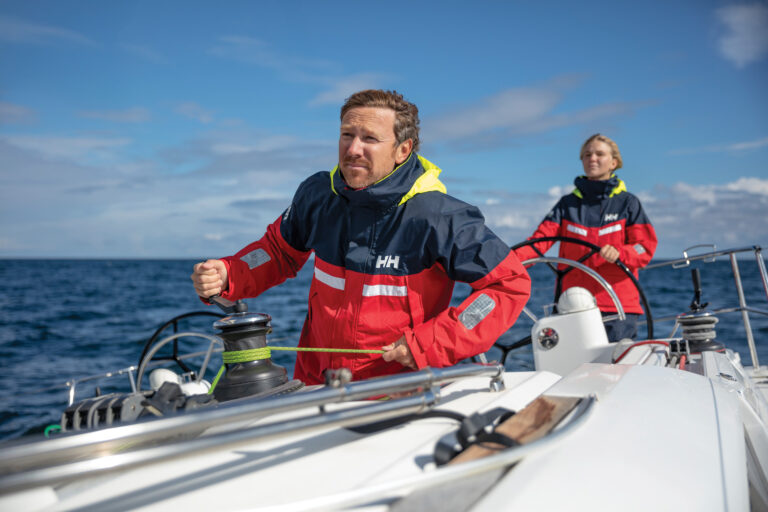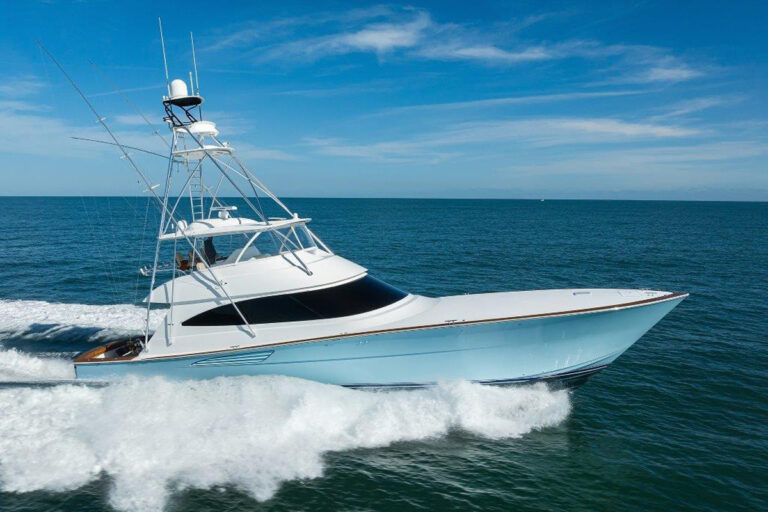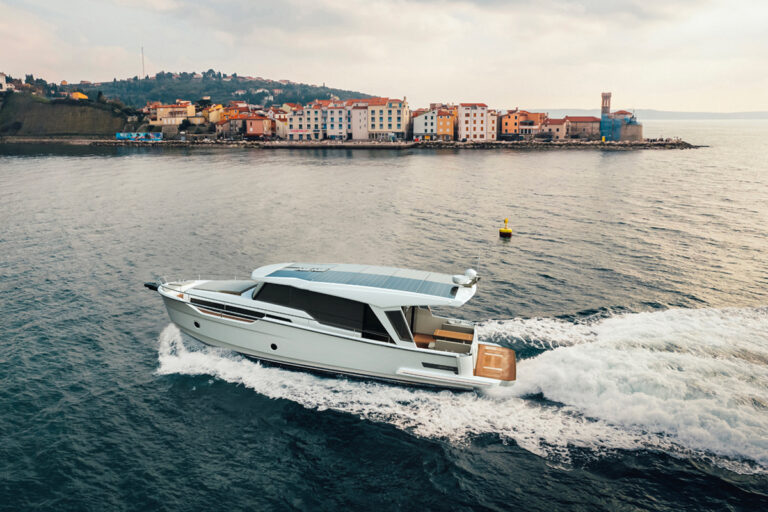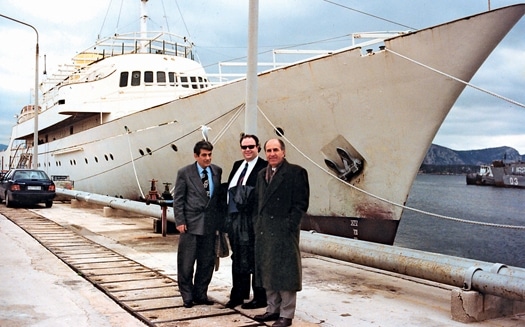
ytgnov17greek525.jpg
So I ask my dentist, who happens to be comedic actor Adam Sandler’s sister, whether I can keep the copy of Yachting magazine I had been perusing in the waiting room of her Manchester, New Hampshire, clinic. “You’d never believe it,” I say through swollen novocain lips. “Yachting says somebody from Keene just bought Aristotle Onassis’s yacht Christina.” Sure, keep the magazine, Dr. Elizabeth Sandler says.
The year is 1994 and Adam Sandler’s fourth movie is due for summer release, and since I am reclined helplessly in her chair, I feel obliged to confess my admiration for her funny-guy brother. As for the magazine, Dr. Sandler knows that as editor of the statewide New Hampshire Sunday News, I want to develop the “local angle” on the Christina sale originally reported as a brief item in Yachting’s “cross currents” section.
First of all, Keene is a small landlocked New Hampshire city known for its state college and very little else. Secondly, the late shipping tycoon Aristotle Onassis is widely reviled in New Hampshire for once having sought to convert the Isles of Shoals, a scenic archipelago four miles off the coast, into a terminal for offloading his oil tankers.

| | |
Christina is a converted World War II-era Canadian destroyer named after Onassis’s daughter. The 325-footer is not just a wealthy man’s plaything, but a floating backdrop for post-war history. JFK met Winston Churchill aboard her in 1954, and JFK’s widow Jackie celebrated her marriage to Onassis in a reception aboard the vessel in 1968. Along the way, Christina hosted some of the world’s most famous people, including Richard Burton and Elizabeth Taylor, Marilyn Monroe, Frank Sinatra, Maria Callas, and King Farouk. After Onassis died in 1975, his heirs donated Christina to the Greek government, which neglected the vessel and then offered her for sale in the late 1980s.

| | |
I assign the Christina story to Amy Vellucci, one of several excellent reporters with whom I’ve worked. She’s smart, sly, persistent, and, unlike most of the breed, actually has some fashion sense. Working the telephone, Vellucci quickly identifies the Christina buyer as Alexander Blastos, 28. She sets up an appointment to interview him at his uncle’s restaurant in Keene. And guess what, she says her sources have revealed that young Mr. Blastos works at the restaurant as a busboy.
What have we here? Blastos has $2.1 million to buy Christina from the Greek government, and fund the restoration, but he’s clearing tables at the hungry Lion?
And, oh yeah, one more thing, she says, Chris Spirou is involved in the deal.
To summarize in a paragraph what could be covered in a book: Spirou is one of the 20th century’s great influence-peddlers. Leveraging New Hampshire’s quadrennial first-in-the nation Presidential primary, this Greek-American politician has been a confidant of Walter Mondale, Al Gore, and the Clintons. The boy from the Balkans also has connections within various Greek and Serbian governments, and played a somewhat mysterious role at the Dayton Peace accords to end the Bosnian war.
Spirou meets busboy Blastos through the restaurateur uncle, Michael Blastos, another Greek-American politician, city councilor, and future mayor of Keene. Spirou apparently wants to manage Christina’s $40 million overhaul once the purchase is final.
I know we don’t do this very often, I tell Vellucci, but we’ve got to tape-record this interview in Keene. And keep asking them about the money. Where is Blastos getting the $2.1 million and all the rest? Keep repeating the question until you get an answer.
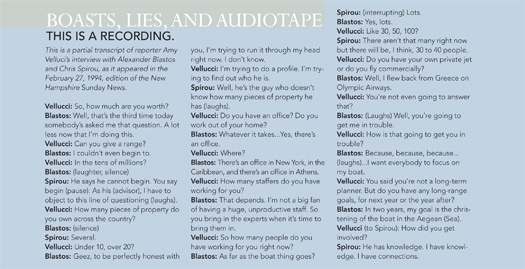
| | |
Looking Back At The News
Looking back at the transcript of that interview, I marvel at Vellucci’s aggressiveness and the pain it must have caused Blastos and Spirou, whose answers yielded not a single checkable fact. The would-be yachtsmen obviously had expected a gee-whiz puff piece, but found themselves ambushed instead.
Blastos and Spirou do admit they are not mariners themselves and say they have a business plan for the boat. Once restored, Christina is to be put into service as a charter yacht. They provide Vellucci with two color photos, reproduced here, that show Blastos posing on the Christina’s worn bridge and one with Spirou and a third unidentified man in front of the bow of the boat.

| | |
The following Sunday the Blastos-on-the-bridge photo is displayed prominently on the front page beneath the skeptical headline: “But Where’d You get the Dough, Skipper?” Quoting Blastos’s own words, the Vellucci article paints a picture of Olympian evasiveness.
Two days after the article appears, I receive a telephone call from a Greek newspaper asking me to fax a copy. When the Greek paper repeats my “Skipper” headline the next day, people in Athens probably ask themselves what filo (dough) has to do with anything, but the story nevertheless casts doubt on Blastos’s credibility. Later his uncle Michael testifies that Blastos would have gotten away with his scheme had he resisted the temptation to boast about it to the Sunday News.
Unlike his vague answers for Vellucci, Blastos had made very specific representations to Greek officialdom. Calling Blastos “the ultimate con man,” federal judge Hugh Bownes later writes:
The defendant posed as a man of great wealth by falsifying loan agreements, investment statements, and his net worth. When in 1993, the defendant bid $2.1 million on the yacht, his bid was accepted by the Greek government. Over the course of the next year, his charade continued. He used “his” yacht, which in reality he did not yet own, as collateral for other business ventures and engaging yacht decorators and designers. The facts make clear that Blastos was far from the wealthy man he pretended to be; for the years 1991 through 1995, the defendant reported income totaling only $2,600.”
As it turns out, Blastos also secures an agreement with the german government to have Christina refurbished at a German shipyard in exchange for a multi-milliondollar incentive payment. He intends to pay the Greeks with German money, and worry about how to pay the German shipyard later. Early in the deal, the Greeks have enough confidence in Blastos that they turn away another bidder, but the negative publicity makes them wary. Athens refuses to release the Christina until Blastos pays, and the Germans refuse to hand over the “incentive” cash until Christina arrives at their yard.
So the deal implodes, but not before Blastos, otherwise penniless and living with mom, is wined and dined across Europe by a marine industry hungry for his business.
As the law closes in on him, Blastos exhibits his chutzpah one last time. While waiting for his arraignment on wire fraud charges, he happens to be staying with friends in Ft. Lauderdale. When the time comes for his hearing, Blastos hires a private jet to fly him back to New Hampshire, writing a worthless check for $9,672 to pay for the flight.
After a four-day jury trial in august 2000, a federal judge in New Hampshire sentences Blastos to five years in prison.
Where Are They Now?
Chris Spirou avoids any consequences for his role in the Blastos escapade. The Democratic power broker takes credit for delivering the Greek-American vote to Hilary Clinton in the 2008 New Hampshire Primary; her granite State victory sets the stage for an eight-month slugfest against Barack Obama for the presidency.
Amy Vellucci still works for the Union Leader newspaper group, as publisher of its Manchester-area weeklies.
In 1998, John Paul Papanicolaou purchases the Christina and has her lovingly restored over a three-year period. Like his family friend Aristotle Onassis, he earned his wealth in the shipping business. Renamed the Christina O, she continues to ply the Mediterranean in charter. And, yes, the barstools have the same unique upholstery-the foreskins of whales. Entertaining lady friends, Onassis liked to tell them that they were sitting on one of the world’s biggest…you can guess the rest.
Blastos doesn’t answer his telephone. Alexander, if you’re reading this, please give me a call. Enough time has passed, and I’d like to hear more of the story.
After the New Hampshire Sunday news, Peter Swanson drifted into marine journalism. A regular contributor to Yachting, he can be contacted by e-mailing petercswanson@msn.com_._

